The beauty and value of jade, as well as the multi-billion dollar profits in the jade industry, can only be compared to the extreme poverty and despair that affects the miners and workers in the jade mining in the mountains of Myanmar (Burma).
Let’s see what is behind the large mining companies for the extraction of jade.
Torrent of rubble and scream. Armed with sticks and hammers, the workers begin their search.
We’re in the Jade hills of Myanmar in Kachin states in the northeast of the country. Sam Ong is hoping for a find that will make him rich.
“He says he found two stones. It’s his lucky day.”
Men from all over the country flock here to the edges of the jade mines in the Himalayan foothills to dig for that single stone that will make him a fortune. There are even children among the scavengers picking through the tailings from the mines. It’s perilous work.
There’s at least one death a month. When somebody gets buried in a landslide or killed by rocks. The stones can roll down the hillside at high speed. The bigger fragments could break your bones you wouldn’t stand a chance. Sometimes in the rainy season the whole slope of the mud bath.
One mountain after another is being reduced to rubble by prospecting of this mineral.
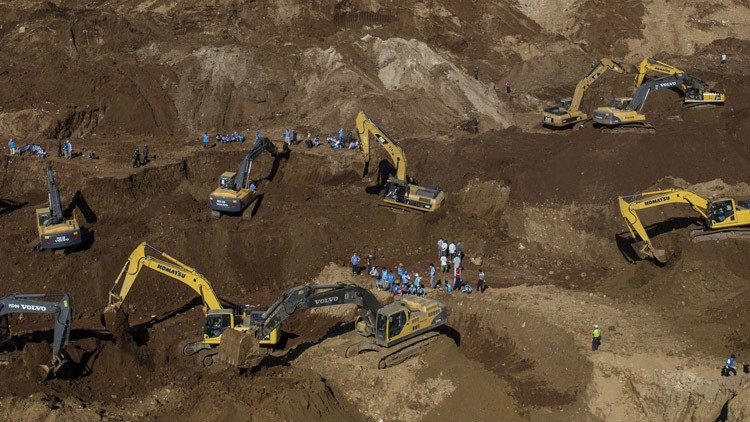 Jade mining in the mountains in Northern Myanmar
Jade mining in the mountains in Northern MyanmarKachin is jade country. The world’s largest deposits are here on the border with China. But the stone of heaven as it’s known in China is stained with blood.
A war is raging in Kachin. But one that’s hidden from international view. A war over land and resources. Jade mining is a billion dollar industry controlled by the military. Few of the mines are controlled by the ethnic kachin, who are native to the jade hills.
The party of Nobel Peace Prize winner and Myanmar’s de facto leader Aung San Suu Kyi came to power in two 2015. It promised to put an end to the fighting between the military and ethnic Kachin guerrillas seeking self rule in northern Myanmar. Jade is the biggest obstacle to peace. But the war has worsened. One hundred thousand people have been forced to flee.
“Our home was in the middle of the battlefield. If we stay, we would be dead now. We had to leave everything behind.”
But there’s no trace of the war in Mandalay, the former capital. Glittering gold pagodas line the ninety Irrawaddy. Gold, tropical wood and jade. Myanmar is rich in natural resources.
Mandalay is a hub of the jade trade.
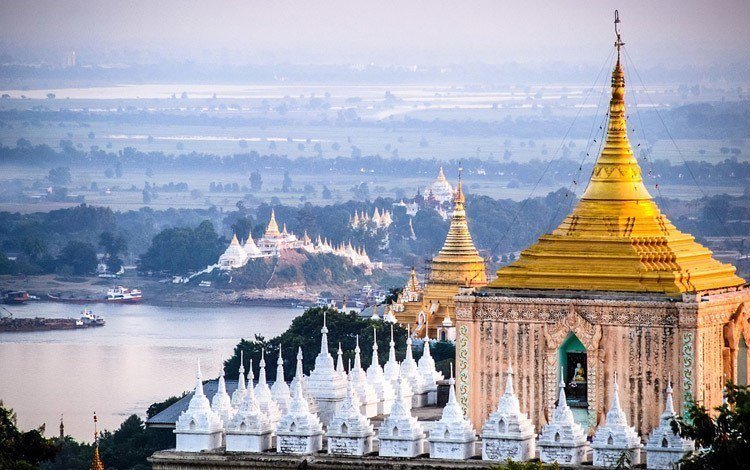 Mandalay, Burma, pagoda
Mandalay, Burma, pagodaFen Cing has made a fortune with the near translucent green stones. He trades mainly in large stones. The jade trade is lucrative. Thirty one billion dollars worth of jade or minded Myanmar every year. One kilogram alone of the finest jade can fetch millions.
Fen Cing shows off his giant stones. Most of his clients come from China.
The Chinese think the Jades good for your health. That it has a cooling effect. A stone like this can be unbelievably expensive. The more translucent it is, the higher its price.
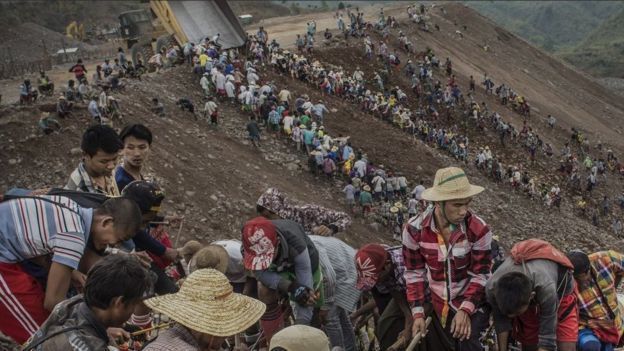 Workers manually mined jade. Kachin, Myanmar.
Workers manually mined jade. Kachin, Myanmar.But the human cost of jade is even higher. Many of the mine workers end up with drug habits: opium, heroin, crystal meth.
“We thought the drugs will protect us against malaria. I kept taking more and more. I ended up in hospital. I couldn’t get off them.”
These men have been forced to go cold turkey.
Christian aid organizations are trying to fight the drug epidemic in northern Myanmar. There are methods include sing a songs and Bible readings.
Drugs are illegal in Myanmar. But ubiquitous. The military and the police have their hands in the drug industry too.
“The mines are lawless. The drug trade is controlled by gangs. They’re making lots of money. Working in the mines is exhausting and the miners are a long way from their families. They’re very vulnerable.”
Local activist
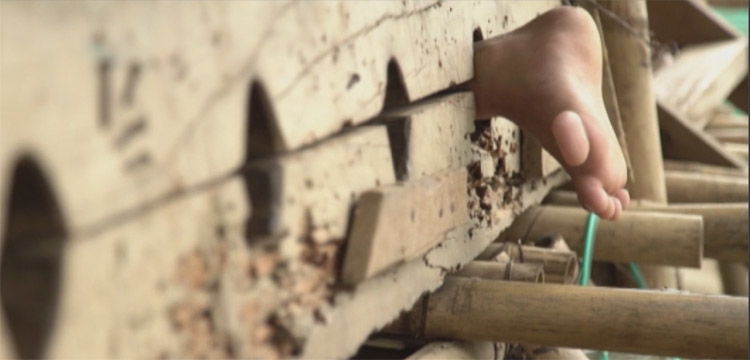 Arrest of the offender and his detention for several days
Arrest of the offender and his detention for several daysSome of the camps rehabilitation methods are draconian. Medieval even. This inmates feet have been shackled to a wooden block. They have only a blanket to keep himself warm.
“I behave badly, so they brought me here. I’ve been here for two days and two nights.”
Prisoner’s confession
It’s an ignominious end to the dream of finding jade and making a fortune. There have take six months, then the men are sent back to their families. Few of them managed to stay clean.
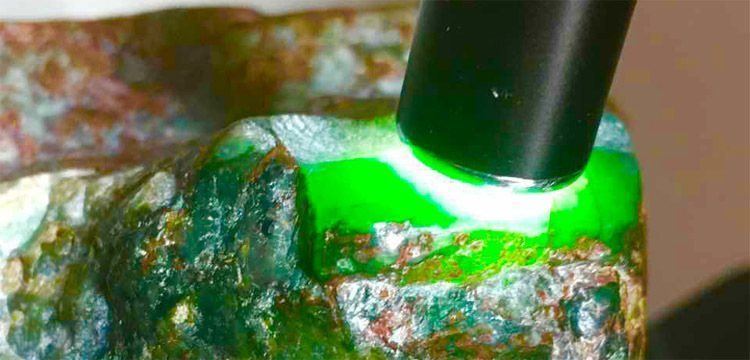 Imperial jadeite from Myanmar (Burma)
Imperial jadeite from Myanmar (Burma)Back in the jade mine. The day is drawing to a close… Sam and the others, size up the day’s takings. The torch light gives them an idea of the stone’s value.
“We are all poor. We all have the same dream to find a valuable stone then we’ll have shrunk rich.”
Sam, the jade miner
But the fortunes made with trade, aren’t made by people like Sam. And for as long as the mines are controlled by military elites, drug kingpins and ethnic Kachin guerrillas. The jade industry will benefit only a few. And peace in Myanmar will remain elusive.
The benefits from the production of jade for locals
Jade has been a status symbol in China for centuries. The country’s nouveau riche spend almost three billion dollars a year on jadeite the purest form of jade. Jade can fulfill your wishes. It brings luck and protects against accidents and diseases.
Trucks transport the jade from Kachin state in northern Myanmar to China.
Really good pieces are often brought into China illegally. The smugglers pay the Myanmar army and the police around one hundred thousand dollars for each truck full of jade.
The locals don’t profit from our natural resources. The Kachin independence army is fighting for its economy and has been battling Myanmar’s military for control of its natural resources.
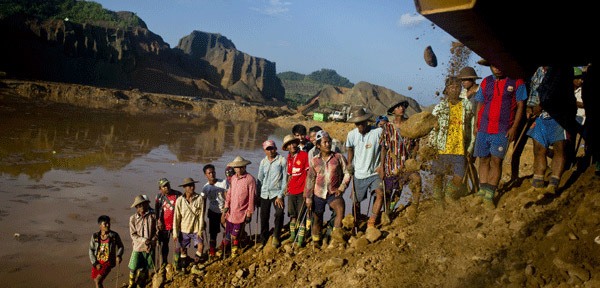 Workers begin to look for jade in a new batch of stones
Workers begin to look for jade in a new batch of stonesBillions of dollars have been invested in Oil and natural gas production facilities. Teak is cut and jade is mined near the Chinese border.
More than a hundred mining companies are active in Hpakant township. Those with connections to the hunter receive the largest prospecting rights. If the mining companies keep it up, soon there won’t be any jade left. Lands are destroyed. Farmers have had to sell their land to the mining companies.
Now miners are trying to earn money peddling jade. People from all over the country come to Hpakant. To work. Or search for jade in the debris from the mines.
They risk their lives in the hope of striking it rich. But hundreds have lost their lives in landslides.
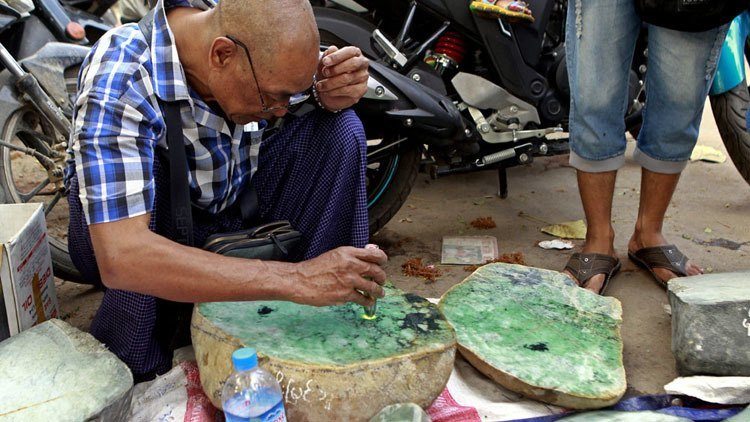 The underground trade of nephrite and jadeite in Myanmar
The underground trade of nephrite and jadeite in MyanmarAccording to the Global Witness some thirty billion dollars worth of jade was mined in Myanmar in 2014. A local businessman says some of the best minds belong to the generals. And they’re running them jointly with the Chinese.
These mining companies operate without a license. They bribe the inspectors from the mining ministry.
The new democratic government wants to implement the initiative for transparency in the raw materials industry. Some high ranking officials have lost their jobs for illegally importing excavators from China. Such measures are making it more difficult for politicians and military officers to line their pockets.
What is jade to you? Share it in the comments on the website or under the video. Tell us whether the stone is worth so many human lives?